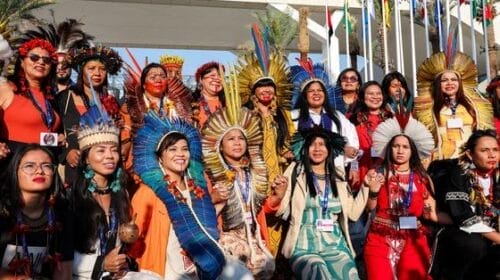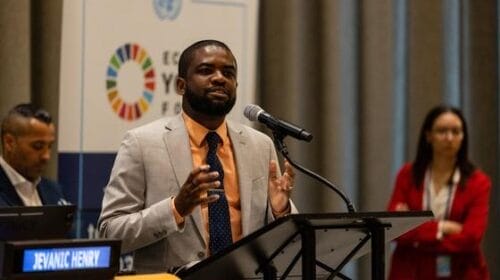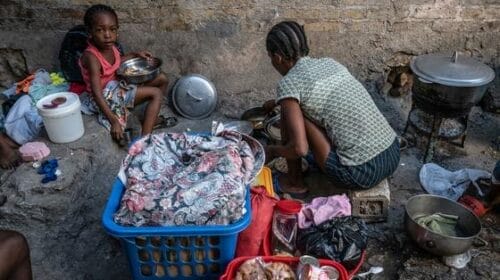Ripple effect of sexual violence in conflict threatens ‘collective security’, stains ‘our common humanity’, says UN chief
Calling the scourge “a tactic of war, to terrorize people and to destabilize societies”, he underscored that its effect can echo across generations through trauma, stigma, poverty, long-term health issues and unwanted pregnancy. He urged that survivors should be heard and their needs recognized.
“They are mostly women and girls, but also men and boys, calling for our support to access life-saving health services, justice and reparation”, he elaborated.
The day also honours those “working on the frontlines”, said the UN chief, “directly assisting victims to rebuild their lives”.
“Our global response must include more concerted action to ensure accountability for the perpetrators – and to address the gender inequality that fuels these atrocities”, stressed Mr. Guterres, adding that “together, we can and must replace impunity with justice; and indifference with action”.
‘Grave human rights violation’
Sexual violence in conflict constitutes “a grave human rights violation with devastating physical, psychological and social consequences” that “impede economic development, social cohesion and sustainable peace and security”, said Federica Mogherini, EU High Representative for Foreign Affairs and Security Policy, and Pramila Patten, UN Special Representative on Sexual Violence in Conflict, in a joint statement marking the day.
While women and girls are “disproportionately the first targets both in times of war and peace”, they highlighted that men and boys are also affected.
“Sexual violence is a crime that is preventable, not inevitable”, they maintained, which they say is why the UN and EU are committed to strengthen their work in “prevention, protection and prosecution, as well as in terms of holistic support to survivors to help them rebuild their lives and livelihoods within their families and communities”.
The women noted that the Security Council’s call for a “survivor-centred approach” aims to guide prevention and response to empower those affected and minimize their risks of social ostracism, stigma and reprisals.
“Ensuring access to comprehensive quality services, including medical care, sexual and reproductive health care, psychosocial support, legal advice and livelihood assistance for victims is therefore key”, they spelled out.
Ultimately, however, they said actions can only make a lasting difference “if they are accompanied by a shift in social attitudes”, such as by raising awareness, amplifying victims’ voices, and ensuring women’s participation in decision-making and peace processes.
“States, international and regional organizations, private sector and civil society all have a role to play in challenging harmful gender norms and preventing sexual violence”, they flagged, underscoring the need to continue working together to “end impunity for perpetrators” and “guarantee access to justice, protection and services for survivors”.
“Their voices, rights and needs must guide our response to foster more equitable and peaceful societies”, concluded Ms. Mogherini and Ms. Patten.
Survivor-Centred Approach
UN Headquarters in New York marked the day with a panel discussion.
Moderated by Tonderai Chikuhwa, chief of the Office of the Special Representative on Sexual Violence in Conflict, Ms. Patten and Virginia Gamba, UN Special Representative for Children and Armed Conflict, were among the voices drawing attention to “the Importance of a Survivor-Centred Approach”; the day’s theme.
Ms. Gamba recounted the distressing stories of girls and women kidnapped, trafficked and raped multiple times throughout various countries. She highlighted one woman who was “every night raped by a different soldier” and, upon her release, felt as though she had done something wrong because no one came to help her.
“We know these horrific stories are only the tip of the iceberg”, she said.
But she also noted some progress, including an increased number of children released from armed groups and forces.
“Even separated from armed elements, children continue to struggle as they attempt to fully regain their place in the family”, she pointed out. “The physical, social and psychological effects of those terrible experiences those children went through will accompany them for a lifetime”.
Moreover, sexual abuse carries an additional stigma that makes it difficult to be be reintegrated back into the community, “especially for those who have had children with their abusers”, she stated, citing it as being “worse than remaining hidden with their captor”.
Victims speak out
Amanda Nguyen shared, first-hand, the account of how as the child of migrants who fled Viet Nam in 1970, she was “at the intersection of conflict and sexual violence”.
“On the day I was raped, I never could have imagined that a greater injustice awaited me than the one that I had already been forced to endure”, she said, before realizing that her path was “all too familiar to millions of people around the world”.
But she refused to be defeated, and instead “re-wrote the law”, saying that “three years after the day I was raped, the United States Congress passed, and President Obama signed,” the Sexual Assault Survivors’ Rights Act, which protects, among other rights, the right to have the evidence of a rape kit preserved without charge for the duration of the statute of limitations.
The programme also featured a UN Population Fund (UNFPA) video of an Iraqi woman who was captured by ISIL terrorists, beaten, hand-cuffed and chained to a window.
I tried to kill myself three times — Rape survivor
“Each day would last a year”, the survivor said. She was taken to the souk al sabaya in Mosul, where she was sold seven times. “They would rape me, and there was nothing I could do about it”.
“It was very difficult, and I tried to kill myself three times”, she explained, adding that she has for two years been attending a treatment centre where she has “learnt from the doctor” that she is “dignified” and must keep her head up.
When UNFPA’s Women and Girls Treatment Centre opened in Duhok, in Iraq in 2015 it had 79 cases. Today, that number has increased to 1,393, where medical exams, social services and psychological support are being offered.





